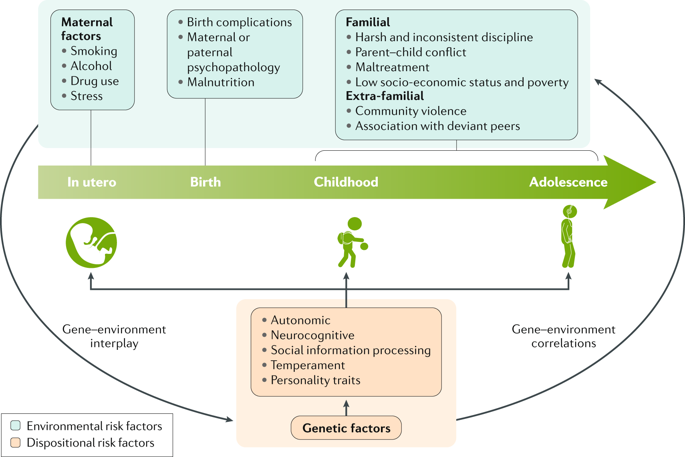Nature Reviews Disease Primers ( IF 76.9 ) Pub Date : 2019-06-27 , DOI: 10.1038/s41572-019-0095-y Graeme Fairchild 1 , David J Hawes 2 , Paul J Frick 3 , William E Copeland 4 , Candice L Odgers 5 , Barbara Franke 6 , Christine M Freitag 7 , Stephane A De Brito 8

|
Conduct disorder (CD) is a common and highly impairing psychiatric disorder that usually emerges in childhood or adolescence and is characterized by severe antisocial and aggressive behaviour. It frequently co-occurs with attention-deficit/hyperactivity disorder (ADHD) and often leads to antisocial personality disorder in adulthood. CD affects ~3% of school-aged children and is twice as prevalent in males than in females. This disorder can be subtyped according to age at onset (childhood-onset versus adolescent-onset) and the presence or absence of callous-unemotional traits (deficits in empathy and guilt). The aetiology of CD is complex, with contributions of both genetic and environmental risk factors and different forms of interplay among the two (gene–environment interaction and correlation). In addition, CD is associated with neurocognitive impairments; smaller grey matter volume in limbic regions such as the amygdala, insula and orbitofrontal cortex, and functional abnormalities in overlapping brain circuits responsible for emotion processing, emotion regulation and reinforcement-based decision-making have been reported. Lower hypothalamic–pituitary–adrenal axis and autonomic reactivity to stress has also been reported. Management of CD primarily involves parent-based or family-based psychosocial interventions, although stimulants and atypical antipsychotics are sometimes used, especially in individuals with comorbid ADHD.
中文翻译:

品行障碍
品行障碍(CD)是一种常见且严重损害的精神疾病,通常出现在儿童期或青春期,其特征是严重的反社会和攻击性行为。它经常与注意力缺陷/多动障碍(ADHD)同时发生,并经常导致成年后的反社会人格障碍。 CD 影响约 3% 的学龄儿童,男性患病率是女性的两倍。这种疾病可以根据发病年龄(儿童期发病与青少年期发病)以及是否存在冷酷无情的特征(同理心和内疚感缺陷)进行亚型分类。 CD 的病因很复杂,遗传和环境危险因素都有贡献,并且两者之间有不同形式的相互作用(基因-环境相互作用和相关性)。此外,CD 与神经认知障碍有关。据报道,杏仁核、岛叶和眶额皮质等边缘区域的灰质体积较小,负责情绪处理、情绪调节和基于强化的决策的重叠大脑回路的功能异常。下丘脑-垂体-肾上腺轴下部和自主神经对压力的反应也有报道。 CD 的治疗主要涉及基于父母或家庭的社会心理干预,尽管有时会使用兴奋剂和非典型抗精神病药物,特别是对于患有多动症的个体。






























 京公网安备 11010802027423号
京公网安备 11010802027423号